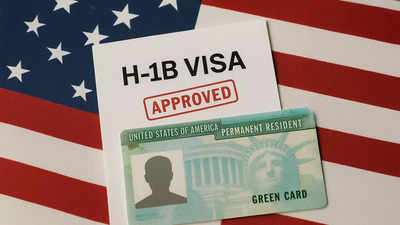US President Donald Trump administration’s policies are causing significant concerns not only among F-1 student visa holders, but also H-1B visa holders and even permanent residents with US green cards. The F-1 visa category serves international students, whilst H-1B permits foreign workers to reside and work in the US for specific periods.
Despite green card holders being in the most secure position, this group is also showing anxiety, resulting in numerous cancelled international trips, according to immigration law specialists who spoke to ET.
The report said that green card holders and H-1B visa holders from India are presently reluctant to leave the US, concerned about potential re-entry difficulties. Immigration specialists are actively recommending that the Indian community remain within US borders.
Also Read | Elon Musk is world’s richest person on Hurun Rich List with $420 billion net worth – it’s the ‘Trump Effect’ at work?
“Since the new Trump administration took office, we have observed a significant increase in questioning of valid non-immigrant visa holders-including H-1B and F-1 visa holders-as well as green card holders at US ports of entry,” said Sukanya Raman, country head, Davies & Associates, LLC, an immigration-focused law firm.
Indian H-1B visa holders are particularly avoiding overseas travel for professional conferences, family occasions, visa processing, and urgent family matters. This behaviour stems from increased scrutiny at entry points, extended visa processing times, and potential entry refusal risks.
“We are seeing a rise in H-1B holders (Indians) not travelling out of the US, fearing a ban on re-entry as there is a high level of insecurity,” said Gautam Khurana, managing partner, India Law Offices LLP, a law firm based out of India.
Experts anticipate stricter visa regulations ahead, with predictions of reduced visa issuance compared to previous decades.
Those awaiting green cards are also anxious.
Also Read | In 7 charts: How India’s GDP has doubled from $2.1 trillion to $4.2 trillion in just 10 years
Consider Neha’s situation, who is in the process of obtaining her green card and awaiting adjustment status. She opted not to visit India despite having an unwell relative. “While this has been an incredibly difficult decision, the circumstances have left us apprehensive about traveling—even once we receive our green cards,” she explained to ET.
Companies are showing reluctance to register candidates and sponsor visas for the FY26 H-1B lottery, citing increased documentation requirements, possible policy shifts, and stricter travel regulations.
An immigration specialist noted that elderly Indian green card holders, especially those who received their status through family-based sponsorship, face increased questioning from US Customs and Border Protection (CBP) officers.
Study abroad consultants report that Indian students and families are reassessing their educational investments. “The H-1B visa process is becoming more stringent, with increased scrutiny and paperwork. Also, with the advent of Gen AI, many jobs are disappearing even in the US thus reducing the demand for IT professionals. This will result in decline in H-1B visa sponsorships,” said Adarsh Khandelwal, cofounder, Collegify (a study abroad platform).
The United States attracts numerous Indian students, who constitute the largest international student population, primarily for STEM programmes on F-1 visas. Subsequently, they seek H-1B visas for employment. The H-1B programme has an annual limit of 65,000 visas for bachelor’s degree holders and 20,000 additional visas for those with master’s degrees or higher from US institutions.
The cap for fiscal year 2025 was achieved in December 2024.











